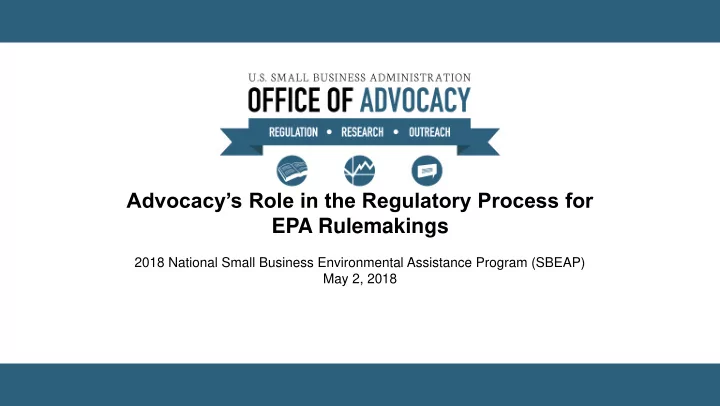

Advocacy’s Role in the Regulatory Process for EPA Rulemakings 2018 National Small Business Environmental Assistance Program (SBEAP) May 2, 2018
Office of Advocacy • Created by Congress in 1976. • Representing small business before Congress, the White House, and the federal agencies. • Works with federal agencies to find alternatives to proposed rules that are disproportionately burdensome to small business. • Mandated by Congress to research topics important to small business. • Chief Counsel leads the independent office.
Independent Office Located in D.C. with 10 Regional Advocates across the country. From the Chief Counsel to the public, comments are not vetted by: • the White House • Congress, or • the SBA. Independent budget authority
Advocacy in Action • Watchdog for small businesses within the Federal government • Oversees agency compliance with the Regulatory Flexibility Act • Extensive outreach to small business community • Assist agencies in Section 610 of the Regulatory Flexibility Act and other retrospective reviews
Regulatory Flexibility Act of 1980 • Applies to rules that must undergo notice and comment rulemaking under the Administrative Procedure Act or any other statute • Agencies must determine whether the rule, if promulgated, would have a “significant economic impact” on a “substantial number of small entities” • Small entities include small businesses, small non-profits, and small governmental jurisdictions 5
Regulatory Flexibility Act (Continued) • Threshold Question: Will the rule, if promulgated, have a “significant economic impact” on a “substantial number of small entities”? • If no, agency head may so “certify” and no further analysis is required • If yes, agency must prepare and publish for comment an Initial Regulatory Flexibility Analysis (IRFA) and Final Regulatory Flexibility Analysis (FRFA) for the final rule.
Executive Order 13272 • Strengthened the RFA by • requiring agencies to issue RFA compliance policies • notify Advocacy of upcoming rules • address Advocacy’s comments with specificity; • Requires Advocacy to • issue RFA compliance guide • train agencies on RFA compliance • report to Congress and OMB
Small Business Regulatory Enforcement Fairness Act of 1996 (SBREFA ) • EPA, as a covered agency, must convene Small Business Advocacy Review (SBAR) Panels before proposing a rule that is expected to have a significant impact on a substantial number of small entities. • OSHA and CFPB are also covered agencies under the RFA • EPA must also issue compliance guides for small business • Permits judicial review of agency compliance with the RFA
White House Review: OIRA and E.O. 12866 • Signed by President Clinton in 1993 (remains in effect) • Applies to significant regulatory actions Centralized review conducted by OMB’s Office of Information and Regulatory Affairs (OIRA) • Requires agencies to prepare a “regulatory impact analysis” – assess aggregate costs and benefits, consider feasible alternatives, avoid duplication, choose the most cost-effective alternative • Meetings with Interested Stakeholders during the review period 9
Regulatory Reform • Advocacy is involved in Regulatory Reform efforts underway as a result of two recent regulatory Executive Orders. • Advocacy’s involvement in helping to reduce the regulatory burden on our nation’s small businesses. • Executive Order 13771 - Reducing Regulation and Controlling Regulatory Costs • Executive Order 13777 - Enforcing the Regulatory Reform Agenda • 10
Regulatory Reform • As a result of President Trump’s Executive Orders, 13771 and 13777, Advocacy has begun an effort to hear first-hand from small businesses across the country about specific federal regulatory burdens facing their businesses. • Under the Regulatory Flexibility Act (RFA), agencies are required to consider the impact of their regulations on small entities when promulgating federal regulations. • Advocacy believes that the RFA and consideration of small business economic impacts is a good place to start when an agency is selecting rules that are being reviewed for reform or elimination. 11
Regional Regulatory Roundtables • Advocacy is hosting small business roundtables in order to hear firsthand from small businesses facing regulatory burdens. • The purpose of Advocacy’s Regional Regulatory Roundtables is to: • Identify regional small business regulatory issues in order to assist agencies with regulatory reform and reduction in compliance with Executive Orders 13771 & 13777; • Compile crucial information for Advocacy’s new report on existing small business regulatory burdens across the nation, identifying specific recommendations for regulatory changes based upon first-hand accounts from small businesses across the country; and • Inform and educate the small business public as to how Advocacy and SBA can assist them with their small business. 12
THANK YOU! Contact Information: Tabby Waqar, Assistant Chief Counsel Email: twaqar@sba.gov; Phone: (202) 205 -6790 13
RELEVANT LINKS
Recommend
More recommend